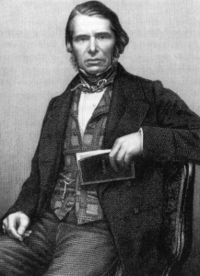

June 25th, 2012
Charles Edward Trevelyan : was he a hero of the people or a self-righteous genocidal villain?
Bio: Trevelyan was born the son of an Anglican Archdeacon. He attended East India College in Haileybury and by 1828 became an employee of the East India Company's Bengal civil service. He rose in position within the British government and eventually became the Assistant Secretary of Her Majesty's (HM) Treasury. He was praised by the government and knighted by the Crown for services to Ireland during the potato blight (famine of 1845 - 1850). It was in this position during the alleged famine that Trevelyan's savage nature surfaced.
In 1840 Charles Edward Trevelyan became Assistant Secretary of HM Treasury. The position put Trevelyan in control of many British affairs; most notable was in 1845, during the potato blight known as the Great Famine . The potato blight was blamed by the British government for famine in Ireland. The famine led to a great many deaths, and as Assistant Secretary of the Treasury, Trevelyan was in direct control of Ireland's famine relief program.
While the population of Ireland was dwindling fast, Trevelyan, by his own publishing, referred to the famine as "a mechanism for reducing surplus population." Was famine and death what he wanted to happen? Take the facts to answer the question. Between 1845 and 1850, approximately 1,500,000 people died of starvation or disease related to consumption of blighted potatoes and another 2,000,000 emigrated, scattered to other areas of the globe. Many Irish (over 500,000) died while in transit. I think the question of whether he wanted this to happen is seen by the outcome in Ireland, and all was the result of decisive inactions, and in other cases decisive actions, of Trevelyan.
Some defend Trevelyan's position saying : but it was a famine, you can't hold him responsible for nature… Was it nature? Ireland had plenty of food, so how could there be a famine with plenty of food? And where did it go? Trevelyan provided military escorts during the transport of food and cattle to the ports for export , bound for England. This was his way to ensure food wasn't taken by a starving population. While, the Irish population was out on the streets, dead or dying, the merciless Trevelyan repeated ceaselessly his credo that the laissez-faire policy of the government would prevail and that it was the only just way to deal with the situation.
A laissez-faire government is one that is supposed to stay out of the way; however there was no issue with government (military) involvement in the transportation of the food to ports. The phenomenon of military escorts in itself shows that laissez-faire was only directed towards the famished Irish population. There was plenty of government involvement getting the food out of Ireland. Did prejudice play its part in all of this? Yes, typical of the English in these times, Trevelyan was a stereotypical Englishman, open about his prejudices against the Irish.
In further pronouncing his disdain for the Irish, Trevelyan announced : "The judgment of God sent the calamity to teach the Irish a lesson, that calamity must not be too much mitigated… The real evil with which we have to contend is not the physical evil of the famine, but the moral evil of the selfish, perverse and turbulent character of the people." I think this statement speaks for itself. No need to articulate further. Trevelyan made his feelings clear.
To add insult to injury, in 2006, someone of his lineage, a BBC reporter, had written a book and did an interview. An article published by independent.ie quoted Laura Trevelyan "I'm not defending him or endorsing some of his actions, but I want to show that he was more humane than has been portrayed" then cited a quote from his personal journal that "the people should not be allowed to starve." Defend Charles Edward Trevelyan all you like, his actions speak louder than words. At any moment Charles Trevelyan could have suspended exports of food, as had been done with all prior famines in Ireland. He had five long famine years to think about doing so and was aware of the effectiveness of such a policy in previous famines, but he did nothing this time. Furthermore, in 1847, Charles Edward Trevelyan spread word the famine was over.1847 was the year the famine had the highest death toll. 1847 became known as ‘Black ‘47'.
The blight went on for years after the devastating ‘Black 47', and Charles Edward Trevelyan remained unwavering in his laissez-faire policy directed only towards the Irish population. Finally by 1850, after 25% of the population of Ireland had perished, the blight came to an end. For his services to Ireland, which meet standards for the U.N. definition of genocide , Queen Victoria of England knighted Charles Edward Trevelyan. Could Charles Edward Trevelyan actually have been doing the work of the English Crown? That we won't know, but it is evident the English Crown was pleased with Trevelyan's nefarious scheme to reduce the "surplus population" of Ireland. So let's ask the question again, was Charles Edward Trevelyan a hero of the people or a self-righteous genocidal villain?